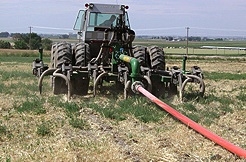
Features
Applications
Business/Policy
Canada
Environment Protection
Protection
Swine
Manure happens, make the most of it
April 3, 2013 by Alberta Agriculture and Rural Development

April 3, 2013 – Livestock manure is a great fertilizer and soil amendment. When proper manure management practices are followed, livestock manure can be utilized as a valuable nutrient resource rather than be treated as a waste.
Manure is an excellent organic fertilizer containing nitrogen (N), phosphorus (P), potassium (K) and many other essential plant nutrients. When added to soil at modest rates, manure not only adds nutrients to enrich the soil, manure will physically benefit the soil. Manure adds organic matter, which improves soil tilth and structure.
“Because manure is organic, there is a perception that manure cannot be harmful to soils or the environment,” says Dr. Ross McKenzie, senior research scientist of agronomy with Alberta Agriculture and Rural Development. “There is no question that adding modest amounts of manure to soil can be very beneficial to improve the physical quality of soil quality and greatly improve soil fertility. However, too much of a good thing over a period of time could lead to both agronomic and environmental problems.”
To prevent problems from developing, intensive livestock operators must use best manure management practices (BMP). It is very important to remember that BMP will vary from region to region and even from farm to farm, depending on the climatic zone of the farm, the type and number of animals in confinement, the total amount of manure produced and how the manure is collected, stored and applied. It will also depend on the amount of land available to apply manure, soil types on the farm, types of crops grown and crop yield potential.
“BMPs need to be specifically tailored to match the needs of each farm,” says McKenzie. “Producers must take a pro-active approach to manure management to ensure the sustainability of both their farm and the environment. Following a step-by-step approach is essential in planning best manure management practices for each farm.”
BMP steps include:
- determine the amount of manure produced by the operation
- ensuring the manure is safely and properly stored
- determine the manure nutrient content before application
- identify and soil sample all fields before manure application
- determine which crops will be grown in each field
- determine manure application rates for each field, based on soil testing and manure testing
- determine when and how to best apply the manure
“Nutrients in manure give it significant value,” says McKenzie. “It is difficult to put an exact value on manure because of the variability in nutrient content and because the nutrients are released over a period of years. However, if we assume that commercial nitrogen (N), phosphate (P2O5) and potassium (K2O) fertilizers have values of $0.65, 0.60 and 0.40 per pound, respectively, and feedlot manure has a total N, P2O5 and K2O content of 21, 18 and 26 lb, respectively, in each ton of manure, the approximate value of one ton of feedlot manure has a potential value of about $35.00/ton.”
Producers who don’t have livestock, but live within 10 km of a confined livestock operation, should consider talking to their neighbors about utilizing manure as a fertilizer source and for improvement their soil quality. The potential to purchase manure from your neighbor by paying for delivery and spreading has a double benefit. The confined livestock operator can dispose of extra manure and a nearby neighbor has the advantage of an excellent source of fertilizer at a reasonable cost. In addition, manure applied to eroded areas of fields will also improve the physical quality of the soil. When neighboring farmers can take advantage of win-win situations like this, the whole agricultural community benefits.
For more detailed information on manure management consult the booklet Nutrient Management Planning Guide – 2007, also available from Alberta Agriculture by calling 1-800-292-5697.